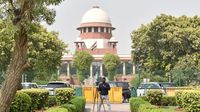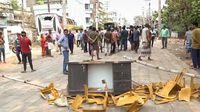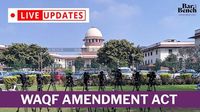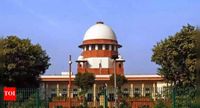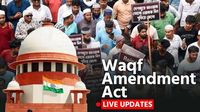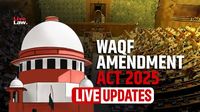The Supreme Court of India is currently hearing a series of petitions challenging the constitutional validity of the Waqf (Amendment) Act, 2025, which was enacted earlier this month. This act has sparked significant controversy, with critics arguing that it undermines the rights of Muslims and interferes with their religious practices.
On April 16, 2025, the Supreme Court bench, led by Chief Justice of India Sanjiv Khanna and including Justices Sanjay Kumar and K.V. Viswanathan, began hearing the case. The petitions were filed by various political leaders and organizations, including AIMIM chief Asaduddin Owaisi and AAP leader Amanatullah Khan. A total of ten petitions have been registered, raising concerns about the act's implications for the management of Waqf properties across India.
The Waqf Amendment Act, which received Presidential assent on April 5, 2025, aims to reform the management of Waqf properties—religious endowments under Islamic law. However, it has been met with opposition from various quarters, including NGOs and political parties, who argue that it discriminates against Muslims and infringes on their right to manage their own religious affairs.
During the proceedings, the Supreme Court sought clarification from the Centre regarding the constitutional basis for allowing non-Muslims to serve on the Waqf Council and Board. Chief Justice Khanna posed a critical question: “Are you saying that from now on you will allow Muslims to be part of the Hindu endowment boards?” This inquiry reflects the broader implications of the act, which some argue could blur the lines between different religious trusts.
Senior advocate Kapil Sibal, representing the petitioners, argued that the inclusion of non-Muslims in the Waqf Council violates Article 26 of the Indian Constitution, which guarantees the right of religious denominations to manage their own affairs. He described the act as a “parliamentary usurpation” of the faith of 200 million Muslims in India, emphasizing that the law interferes with essential religious practices.
In response, Solicitor General Tushar Mehta defended the act, asserting that it does not strip away the rights of Muslims but rather seeks to provide a more structured management of Waqf properties. He emphasized that the act was the result of extensive parliamentary deliberations and aimed to rectify past mistakes in the management of Waqf lands.
The Supreme Court also noted that while certain provisions of the act are beneficial, others require further clarification, particularly regarding the concept of 'waqf by user.' Chief Justice Khanna highlighted the potential issues that could arise if existing waqf properties were suddenly reclassified or denied their status due to the new legislation.
As the hearing progressed, the court was informed that six BJP-ruled states—Haryana, Maharashtra, Madhya Pradesh, Rajasthan, Chhattisgarh, and Assam—have filed pleas in support of the act's constitutionality. These states argue that the reforms are necessary to ensure better management and oversight of Waqf properties, which have historically faced issues such as incomplete property surveys and irregular records.
Meanwhile, the political landscape surrounding the Waqf Amendment Act remains tense. West Bengal Chief Minister Mamata Banerjee has publicly criticized the act, calling it “atrocious” and urging Prime Minister Narendra Modi to reconsider its implementation. She accused the central government of exacerbating communal tensions and facilitating unrest in the region, particularly following recent violence in Murshidabad, which she described as “pre-planned.”
Banerjee's comments came during a meeting with Imams, where she expressed her commitment to protecting the rights of Muslims and demanded accountability from the central government for any actions that may have incited violence. In the wake of the protests, she announced a compensation of ₹10 lakh for the families of those killed in the Murshidabad violence, emphasizing her administration's focus on supporting all citizens, regardless of their religious identity.
In contrast, the BJP has accused Banerjee's government of failing to protect Hindus in West Bengal, claiming that police have allowed rioters to act with impunity. BJP leader Ravi Shankar Prasad criticized Banerjee, questioning her commitment to basic human values and suggesting that her government is more concerned with political survival than with public safety.
As protests against the Waqf Amendment Act continue across the country, the Supreme Court's decision will have significant implications for the future of Waqf properties and the management of religious trusts in India. The court's deliberations will not only address the legal aspects of the act but also the broader questions of religious freedom and the rights of minority communities in a diverse nation.
Seven individuals were arrested in Assam following clashes during protests against the Waqf Amendment Act, highlighting the contentious atmosphere surrounding the legislation. Local authorities have imposed prohibitory orders to prevent further violence, as tensions remain high in the region.
The Supreme Court is expected to continue its hearings on this matter, with the potential for a landmark ruling that could reshape the legal landscape for Waqf properties and the rights of Muslims in India. As the court navigates the complexities of this case, the implications for communal harmony and the management of religious affairs will be closely watched by all stakeholders involved.
